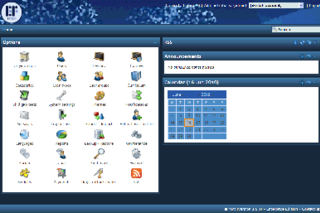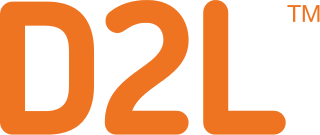Related Research Articles
Shareable Content Object Reference Model (SCORM) is a collection of standards and specifications for web-based electronic educational technology. It defines communications between client side content and a host system, which is commonly supported by a learning management system. SCORM also defines how content may be packaged into a transferable ZIP file called "Package Interchange Format."

Moodle is a free and open-source learning management system (LMS) written in PHP and distributed under the GNU General Public License. Developed on pedagogical principles, Moodle is used for blended learning, distance education, flipped classroom and other e-learning projects in schools, universities, workplaces and other sectors.
A learning management system (LMS) is a software application for the administration, documentation, tracking, reporting, automation and delivery of educational courses, training programs, or learning and development programs. The learning management system concept emerged directly from e-Learning. Although the first LMS appeared in the higher education sector, the majority of the LMSs today focus on the corporate market. Learning Management Systems make up the largest segment of the learning system market. The first introduction of the LMS was in the late 1990s.
ATutor is an Open Source Web-based Learning Content Management System (LCMS).

ILIAS is an open-source web-based learning management system (LMS). It supports learning content management and tools for collaboration, communication, evaluation and assessment. The software is published under the GNU General Public License and can be run on any server that supports PHP and MySQL.

Ali Jafari Persian: علی جعفری),) the Founder and CEO of http://theCN.com is a serial entrepreneur who is well known for his research and entrepreneurship in the area of Information Technology (IT), more specifically, on development of a series of Learning Management System (LMS). Dr. Jafari's achievements in the development of concepts and technology systems in Learning Management Systems (LMS) have earned him recognition as one of Indiana's leading high-tech success stories and a global unofficial title of father of LMS. Jafari is considered as one of the global pioneers in envisioning and developing new eLearning systems and pedagogical methods https://inventors.iu.edu/inventors/jafari-ali.html. Ali Jafari is currently working as a Professor of Computer and Information Technology at the Purdue School of Engineering and Technology and as the Director of the CyberLab at Indiana University-Purdue University Indianapolis (IUPUI). He earned his BS in Business Administration from the University of Isfahan, Iran, before he moved to the United States to pursue a MS in Media Technology at the University of Wisconsin. He completed his doctorate studies in Telecommunications and Mass Communication from Indiana University in Bloomington, Indiana.
The Advanced Distributed Learning (ADL) Initiative is a US government program that conducts research and development on distributed learning and coordinates related efforts broadly across public and private organizations. ADL reports to the Deputy Assistant Secretary of Defense for Force Education and Training in the US Department of Defense (DoD). Although it is a DoD program, ADL serves the entire US federal government, operates a global partnership network including international defense ministries and US-based academic partners, and collaborates closely with industry and academia. ADL advises the DoD and US government on emerging learning technologies, best practices for improving learning effectiveness and efficiency, and methods for enhancing interoperability. Notable ADL contributions to distributed learning include the Sharable Content Object Reference Model (SCORM), Experience API (xAPI), and the DoD Instruction 1322.26.

eFront is an eLearning platform (also known as a Course Management System, or Learning Management Systems, or Virtual Learning Environment ). eFront has historically been coming in a number of editions, from an open-source edition to the latest eFrontPro edition.

D2L is a global software company with offices in the United States, Canada, Singapore, Australia, Europe, and Brazil. It is the developer of the Brightspace learning management system, which is a cloud-based software used by schools, higher education, and businesses for online and blended classroom learning. D2L is also the developer of Open Courses, a Massive Open Online Course platform.
Gamification is the application of game-design elements and game principles in non-game contexts. It can also be defined as a set of activities and processes to solve problems by using or applying the characteristics of game elements. Gamification commonly employs game design elements to improve user engagement, organizational productivity, flow, learning, crowdsourcing, knowledge retention, employee recruitment and evaluation, ease of use, usefulness of systems, physical exercise, traffic violations, voter apathy, and more. A collection of research on gamification shows that a majority of studies on gamification find it has positive effects on individuals. However, individual and contextual differences exist.

Genesys, or Genesys Telecommunications Laboratories, Inc., is a company that sells customer experience and call center technology to mid-sized and large businesses. It sells both cloud-based and on-premises software. Genesys is headquartered in Daly City, California, and has offices in Canada, Latin America, Europe, the Middle East, Africa, Asia, and Australia. The company was founded in 1990 and was most recently acquired by Permira Funds and Technology Crossover Ventures in February 2012.
Docebo is a software as a service learning management system. Established in 2005, Docebo offers a learning portal for companies and their employees, partners and customers. Docebo is compatible with SCORM 1.2 and 2004 as well as Tin Can. Developed by Docebo Srl, the program was originally released under a GPL V. 2.0 license with no licensing costs. The program now operates as a cloud-hosted software as a service platform as well as being third-party compatible. It currently runs version 7.5. The company using the platform loads a course, creates a username and password for employees, and tracks the progress of its users. Docebo is available in more than 40 languages. While the primary users of Docebo are midsized companies, it is also assessable for large companies and SMEs. Docebo also has their platform being used for external enterprise training.
iSpring Suite is a PowerPoint-based authoring toolkit produced by iSpring Solutions that allows users to create slide-based courses, quizzes, dialog simulations, screencasts, video lectures, and other interactive learning materials. The output courses are published in HTML5. iSpring-made courses are compatible with the following LMS standards:SCORM 1.2, SCORM 2004, AICC, xAPI, and cmi5.
The Experience API (xAPI) is an e-learning software specification that allows learning content and learning systems to speak to each other in a manner that records and tracks all types of learning experiences. Learning experiences are recorded in a Learning Record Store (LRS). LRSs can exist within traditional learning management systems (LMSs) or on their own.
A Learning Record Store (LRS) is a data store system that serves as a repository for learning records collected from connected systems where learning activities are conducted. It is an essential component in the process flow for using the Experience API (xAPI) standard by ADL or the Caliper standard by IMS Global. The Experience API is also known as the "Tin Can API" and is an Open Source e-learning specification developed after AICC and SCORM. The concept of the LRS was introduced to the e-learning industry in 2011, and proposes a shift to the way e-learning specifications function.
An Coppens is a Belgian consultant and gamification expert as well as the author of Leading the boss in the mirror.
Inquisiq R4 is a web-based SCORM compliant Learning Management System (LMS) that is owned by ICS Learning Group Inc. Inquisiq R4 is used for delivering and tracking both e-learning courseware and traditional training. The product is available as either a Software-as-a-Service (SaaS) model or an unlimited user on-premises model hosted by the customer or the vendor.

Unicheck is a cloud-based plagiarism detection software that finds similarities, citations and references in texts.
A training management system (TMS), training management software, or training resource management system (TRMS) is a software application for the administration, documentation, tracking, and reporting of instructor-led-training programs. TMSs are focused on back-office processes and are considered a tool for corporate training administrators as such, a training management system acts as a central enterprise resource planning (ERP) software specific to the training industry. They can be complemented by other learning technologies such as a learning management system, and are part of the educational technology ecosystem.

Udutu is an SAAS platform for e-learning, and is based in Victoria, British Columbia. The company's Udutu LMS product is used for employee training, customer training, channel training, and compliance training. Udutu also offers a course authoring tool and a PowerPoint to HTML5 converter for SCORM compatibility.
References
- 1 2 "LMS Review: Growth Engineering". Talented Learning. June 13, 2016. Retrieved August 13, 2017.
- ↑ Srivastava, Av (August 30, 2017). "Engineering Training and eLearning". Learning Light. Retrieved August 30, 2017.
- ↑ Everett, Cath (September 28, 2016). "Gamification can Engage Staff and Help Professional Development". Raconteur. Retrieved August 30, 2017.
- ↑ "Adopters". TinCanAPI. 2017-09-01. Retrieved 2017-09-01.
- ↑ "Global Corporate Game-Based Learning Market 2017-2021 | Market Research Reports - Industry Analysis Size & Trends - Technavio". www.technavio.com. 2017-04-01. Retrieved 2017-09-08.
- ↑ "Profile: Juliette Denny, Growth Engineering". The Independent. 2005-06-19. Retrieved 2017-08-23.
- ↑ "LMS Review: Growth Engineering Academy LMS - Talented Learning". Talented Learning. 2014-06-13. Retrieved 2017-08-23.
- ↑ Kulkarni, Rhucha (2017-08-23). "Learning Management Systems to Look Out For". Hrtechnologist.com. Retrieved 2017-08-23.
- ↑ O'Neil, Erin (2016-09-29). "UK-based company enters top 20 gamification list". Lsbf.org.uk. Retrieved 2017-08-23.
- ↑ Iosub, Ancuta (2014-06-06). "Is Gamification of Learning the Future of Education?". softpedia. Retrieved 2017-08-23.
- ↑ "The Leap 100: The definitive list of fast-growth companies for 2016". Mishcon de Reya. 2016-04-20. Retrieved 2017-08-23.
- ↑ Weiss, Craig (2015-01-28). "Top 10 LMSs of 2015". The Craig Weiss Blog. Retrieved 2017-08-23.
- ↑ Weiss, Craig (2016-12-07). "Insight – The Top 50 LMS 2017 Report". The Craig Weiss Blog. Retrieved 2017-08-23.
- ↑ "Academy Platform LMS Reviews and Pricing - 2017". www.capterra.com. 2017-09-28. Retrieved 2017-09-28.
- ↑ Denny, Juliette. "Genie - eLearning Industry". eLearning Industry. Retrieved 2017-09-28.